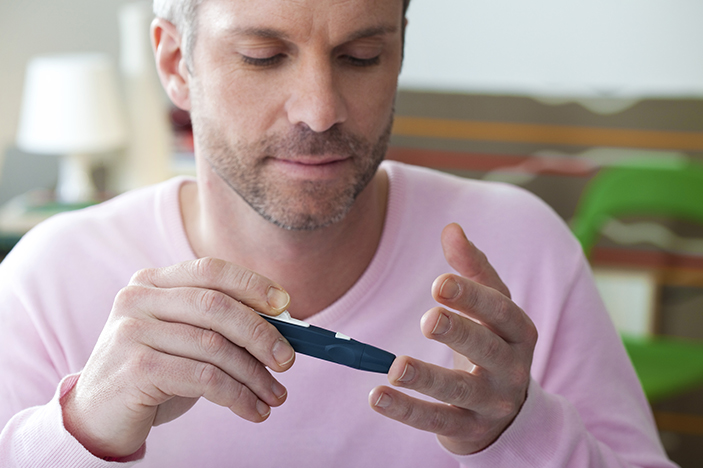
Low testosterone and sexual health issues are just some of the side effects that men with diabetes may experience.
It’s a staggering fact that 11.3% of the population of the United States (that’s more than 37 million children and adults) has diabetes, a lifelong disease that impacts the way the body handles glucose in the blood.
But, men develop diabetes slightly more than women do. According to the Centers for Disease Control and Prevention, 15.5% of men were estimated to have diabetes as of 2020, compared with 13.2% of women.
The American Diabetes Association notes that because men tend to ignore their health issues, their lives are often shorter and more fraught with illness than women’s. Just as it does in women, diabetes can cause complications, such as neuropathy and vision problems, in men.
But, men can also experience specific sexual health issues, as a result of diabetes. Men are more likely to have urological and sexual problems, if they fall under the following categories:
- Blood sugar above the normal range (fasting blood sugar should be under 100 mg/dl)
- High blood pressure or high cholesterol
- Smoker and/or overweight
- Older than 40
- Physically inactive
Type 2 diabetes may cause the following health issues in men:
Low testosterone
Type 2 diabetes doubles the risk for having low testosterone. When the male hormone drops, it can result in symptoms such as low energy, muscle loss, depression and sexual problems, including low libido and erectile dysfunction (ED). Your primary physician can check your testosterone level and offer medications to treat the problem.
Erectile dysfunction
Men with diabetes are much more more likely to experience ED than men who don’t have diabetes, according to a report published in Diabetes, Metabolic Syndrome and Obesity. High blood sugar harms small blood vessels or nerves, which can affect a man’s ability to get an erection.
Some diabetes medications can cause sexual side effects, like ED, which can be treated. ED should be treated as soon as the patient experiences the symptoms, in order to solve the problem.
“Some patients with ED do not realize that their diabetes plays a role,” says Mike M. Nguyen, MD, a urologist at Keck Medicine of USC and associate professor of clinical urology at the Keck School of Medicine of USC. “These patients often also have obesity and hypertension, additional risk factors for erectile dysfunction.”
Urologic issues
Diabetes can harm the nerves that control the bladder. This may cause urological issues, such as an overactive bladder and urinary tract infections.
Urine retention, which leads to incomplete or infrequent urination, is another possible result of high blood sugar. It can also cause kidney damage in the long run.
“Patients with diabetes are also at increased risk for being diagnosed with urologic cancers, including prostate cancer and kidney cancer,” Dr. Nguyen adds.
Ways to fight the problem
Many health complications caused by diabetes can be addressed and treated. The first thing to do is discuss your specific symptoms with your physician. You also need to openly address sexual problems with your partner at home. If you are embarrassed or find it too difficult to share the issues with your doctor, you can write them down or email your doctor in advance that you want to share some sensitive information with them.
There are certain actions you can take to fight high blood sugar. They include:
- Eating a balanced diet with fresh fruits and vegetables, lean protein and whole grains
- Avoiding excess sugar and calories
- Quitting smoking
- Exercising regularly — just walking for 30 minutes a day can make a big difference in lowering your blood sugar
- Maintaining a healthy weight. Even losing two to three pounds per year helps battle Type 2 diabetes in the long run.
“Weight control may help both control diabetes and directly reduce urological side effects,” Dr. Nguyen says.
If you think you may be at risk for diabetes or are experiencing some of the symptoms of the disease, talk to your primary care physician.
Topics
